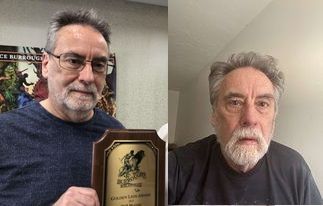 First Comics News: How did you first start writing professionally?
First Comics News: How did you first start writing professionally?
Will Patrick Murray: I think my Afterword to the Bantam Books edition of the lost Doc Savage novel, The Red Spider, in 1979, was my first paid writing gig. Not long after, I interviewed Richard Sapir and Warren Murphy of Destroyer fame and this led to my compiling The Assassin’s Handbook for them and eventually ghost-writing some 40-plus Destroyer novels. This led to covering films for Starlog, starting with Remo Williams: The Adventure Begins and continuing up to Watchmen. I broke into Marvel Comics writing the Destroyer B&W magazine, which ultimately led to Squirrel Girl.
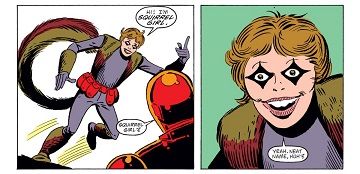
1st: How did you and Steve Ditko come up with the idea for Squirrel Girl?
Will: Actually, I came up with Squirrel Girl before Steve entered the picture. I based her on a girlfriend I had in the 1980s who was into comic books, as well as animal rescues. Squirrel rescues were a specialty of hers. She was also a Ditko fan!
One day at church, she unzipped the front of her winter jacket and a baby squirrel poked its head out. She had found it and was keeping it warm. I had no idea it was there!
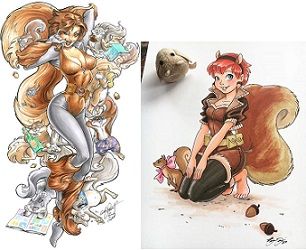
Will: Doreen was created for a fill-in story meant for an issue of Iron Man that ended up in Marvel Superheroes. Tom Morgan was slated to draw her first appearance, but Steve Ditko walked into my editor’s office one day, looking for work, and my script was handed to Steve. Steve gets credit for designing Squirrel Girl’s original outfit, as well as her knuckle spike. I wanted Doreen to wear a Peter Pan-style outfit, but Steve changed it to something more squirrelly. Mary Martin’s Peter Pan was another influence.
Squirrel Girl has beaten numerous opponents, who would you most like to see her beat that she has not?
I’d like to see Squirrel Girl crush Darkseid flat. Having beaten Thanos and shown that she’s the most powerful person in the Marvel Universe, I think the DC Universe deserves to be treated equally and put in its place. Doreen is the one to do it.
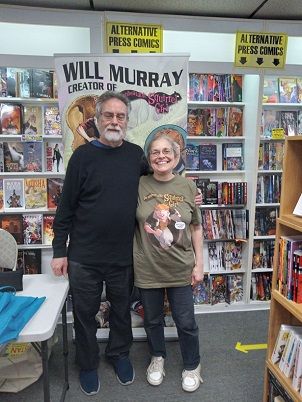
1st: What makes Squirrel Girl so loved by some and hated by others?
Will: Because she upends the prevailing cultural concept that the most powerful superheroes are strong men.
When Squirrel Girl first appeared, Marvel was running a monthly thing called the Cool-o-meter––a sliding scale of what was considered cool. One month she showed up at the bottom of the Cool-o-meter. A month or so later she resurfaced at the top of the Cool-o-meter. She’s like that. People either love or hate her. I think she appeals to the underdog in a different way than most superheroes. The fact that she’s a powerful young female probably annoys a lot of teenage and young adult men. But girls and women love her. She loves them back.
1st: What is the attraction of pulp stories?
Will: Pulp fiction is pretty basic fiction. Good versus evil. Strong, confident heroes against even more confident villains who are even stronger, but the good guys always win. They’re modern myths, morality plays and escapist entertainment rolled into one dynamic package. Put another way, pulp is working-class fiction for the everyman.
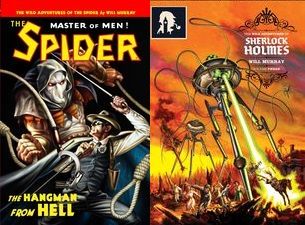
1st: How would you describe the differences between Sherlock Holmes and Doc Savage?
Will: Doc is a more physical character than Sherlock Holmes, but Doc was inspired by Sherlock Holmes, along with Tarzan and others. Doc’s ability to follow clues is equal to that of Holmes. He just displays it differently. Doc is more of an adventure hero and has no problem getting into an airplane and flying off Asia or South America to explore a lost city or put down a revolution. Sherlock Holmes is somewhat of an armchair detective who rarely leaves London, England, and relies on his brain almost exclusively. Holmes is capable of action, too, but on a more modest scale. One is a superman, the other a supermind.
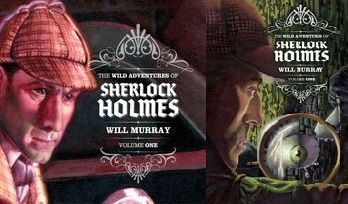
1st: Is it challenging to create new adventures for Doc Savage?
Will: Not really. Almost all of my Doc novels are based on unused outlines or unfinished manuscripts by the original writer, Lester Dent. I just take what he left me and run with it. Working from 80-year-old texts written by my favorite pulp writer is a supreme joy. One of the best-selling of my Doc Savage novels, The Desert Demons, is about 90% Lester Dent. White Eyes, another favor of mine, is probably 30% Dent.
1st: Out of all the pulp characters you have written which one are you most like?
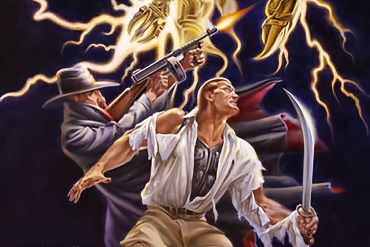
Will: I suppose Doc Savage in the sense that he was multi-talented. He was raised by scientists and other experts and learned virtually every skill or discipline in the world, mastering them all. In my writing, I’ve learned to emulate the distinctive styles of writers ranging from Edgar Rice Burroughs to Norvell W. Page of Spider fame. In my non-writing life, I’ve learned and taught remote viewing, psychic development, and other arcane mental disciplines. So I’m multi-talented, but not on a Doc Savage scale.
1st: How do you feel about being the literary agent for the Lester Dent properties?
Will: I’ve been handling the Lester Dent literary properties since 1979 when I agented The Red Spider to Bantam Books. It’s an honor. I’ve gotten back into print a lot of Dent stories and novels that might have otherwise remained out of print forever. I’m proudest of having put a lot of money into the hands of Lester’s widow, Norma when she was alive.
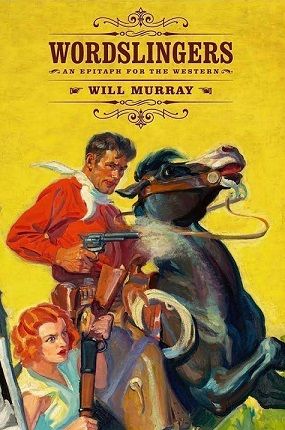
1st: What does it take to be a talented writer?
Will: Well, of course, you need some degree of talent. And you have to constantly develop and improve your craft. Beyond that and maybe more importantly, you need to believe in yourself and have the ability and freedom to pursue this challenging career, despite setbacks, disappointments, discouragement, and the freaks of bad timing and other calamities. I think a lot of very talented writers fall by the wayside because they can’t tough it out psychologically or economically. You have to be flexible and resilient. If your markets collapse, you have to find new markets. If you become outdated as a writer, you must reinvent yourself. Determination is probably the most important ingredient beyond believing in yourself.
1st: How do you find writing novels to writing comic books?
Well: As a novelist, I’m in full control of the story. I like that. In scripting a comic book, I’ve always said that the scripter writes the story, but it’s the artist who tells it for him. The artist can make or break a story. I prefer being a novelist, but I enjoy being a comic book scripter when the opportunity comes on my way and I have great collaborators. I’ve worked with Steve Ditko, Lee Weeks, Ric Levins, Tom Morgan, Carmine Infantino, Don Heck, Dave Cockrum, and others. I’ve been lucky.
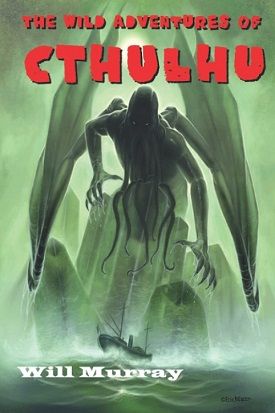
1st: If you met Cthulhu for real how would you react do you think?
Will: Depends on where I would meet him. If I were transported to the sunken city of R’lyleh, I would be terrified. If he showed up in my living room, I might be inclined to show him the door. Seriously, I would probably want to try to understand what he’s thinking and what his motivations are and respond accordingly. This, knowing I am probably doomed.…
1st: You have worked on several superheroes from Marvel and DC which one would you most like to have the powers of and why?
Will: Superman has always been the king of superheroes, and his powers are both diverse and comprehensive. He was my first favorite superhero. I’ve only written one Superman story, but I would say he would be the one. Invulnerability is a pretty good power to have to start with. Being able to fly and do those other super things is pretty much the peak of perfection. That said, I would probably have ditched Lois Lane after the 47th time I had to rescue her…
1st: Any last words for all your adoring fans?
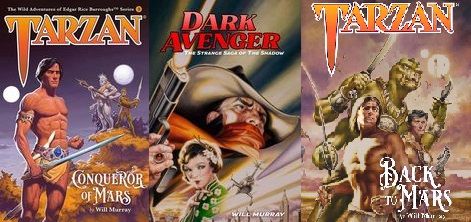
Will: If you count my early fanzine work, I’ve been writing since the 1970s. That’s a long time. I enjoyed my 10 years writing the Destroyer paperback series. And I loved writing for Starlog magazine, and visiting movie sets all around the world. But I find it remarkable that the last dozen or so years have been the most productive and amazing, during which I’ve written crossover novels such as King Kong vs. Tarzan, two novels in which Doc Savage met The Shadow, two other novels where Tarzan went to Mars and encountered John Carter of Mars and several other crossovers. I don’t know how it happened, but I’m very grateful that it did. Most guys my age are retired and playing with their grandchildren. I’m still turning out books that people love. And I deeply appreciate readers supporting my efforts.
